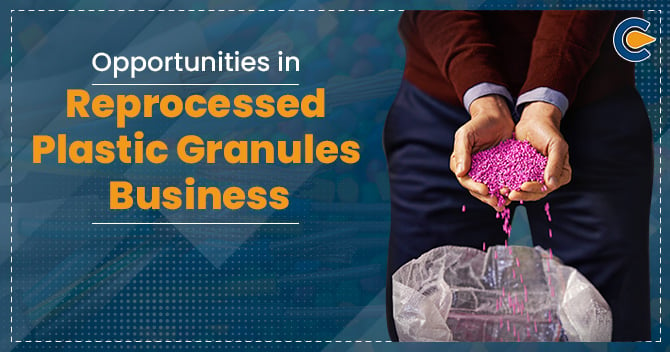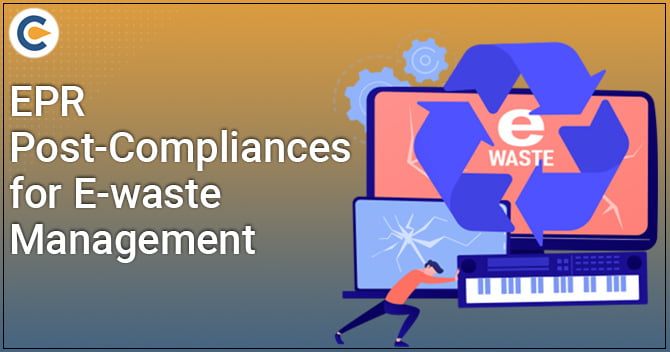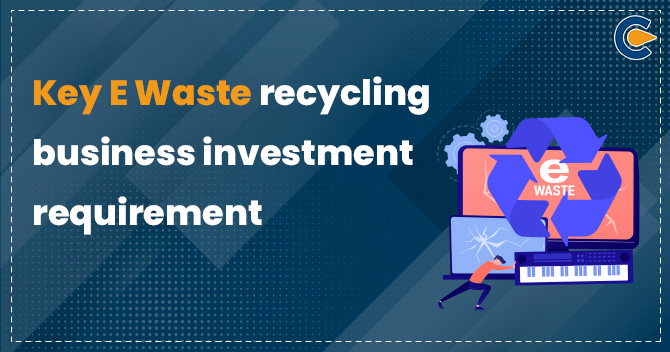The use of plastic has overshadowed today’s world, and the increasing plastic waste has posed a severe threat to the environment and human health. For a long time, our economy has been functioning linearly, working on take-make-use-dispose principle. This led to a runaway production and with that, the generation of massive amounts of waste, particularly related to plastic containing products. With stricter regulations like EPR for PIBOs, rising prices of crude oil in the international market and the vast availability of recyclable plastic waste have started pushing manufacturers’ focus toward reprocessed plastic granules. Reprocessed plastic granules are formed by extrusion of finely shredded plastic after sorting, and cleaning the plastic waste. Reprocessed plastic granules have considerable demand today. It has properties similar to virgin plastic and can be used to make all kinds of products ranging from simple plastic products like packing covers, carry bags, buckets and mugs and even high plastic parts used in electronics and electrical equipment. Many big companies have already started using reprocessed plastics (Nestle, Adidas, Starbucks etc.) in their products and packaging. Many local manufacturers now realise the immense potential and benefits of using recycled plastic. An increased appreciation and acceptance of such recycled products by consumers has also been an added advantage.
Uses of Reprocessed Plastic Granules
Reprocessed plastic granules can be used in many industries that require plastic as a raw material. Being almost comparable to virgin plastic, reprocessed plastic granules can be used as reinforced composites, compression moulding, powder coating, 3D printing etc., apart from the plastic products mentioned earlier.
Demand for Reprocessed Plastic Granules in the Indian Market
The reprocessed plastic granules find a wide usage among manufacturers of plastic related products. Depending on the nature of the plastic granules, some of the main categories of plastic granules in the Indian market have been mentioned below.
- Nylon Granules
- Acrylonitrile Butadiene Styrene granules (ABS)
- Polypropylene granules (PP)
- Polyoxymethylene (POM)
- Polycarbonate granules (PC)
- Poly Methyl Methacrylate granules (PMMA)
- Poly Vinyl Chloride granules (PVC)
- Polystyrene granules (PS)
- Polybutylene Terephthalate granules (PBT)
- Polyethylene granules (PE)
Industrial Demand for Reprocessed Plastic Granules
Depending on their chemical and thermal properties, the reprocessed plastic granules can be used in the manufacture of items like
- PP Granules – For injection moulding, Raffia Bags, Plastic Furniture and Household
- LDPE Granules – for making Pipe, Film, Moulding, Sheets etc.
- HDPE Granules – for making Pipes, Crates, households, Films, Drums etc.
- HIPS Granules –making disposable products and sheets (used in packaging, construction, agriculture etc.)
- ABS Granules –For parts of Automobile, Mixture, Cooler, Engineering products etc.
Factors Favouring the Growth of Reprocessed Plastic Granules Business
The fast-growing plastic waste processing sector has shown that waste plastic processing can be done with limited capital investment and can churn out profit relatively faster. The vast availability of raw materials, high demand for finished products (reprocessed plastic granules), stable rate of the product, high return on investment, and incentives given by the government for establishing the business all these factors have favoured the growth of reprocessed plastic granules business in recent times. Apart from external factors, the fact that a reprocessed plastic granules business is relatively easy to start has also attracted many entrepreneurs to this business. Some of the key aspects that make setting up a reprocessed plastic granules business are listed below.
Technical Aspects of Reprocessed Plastic Granules Business
- Pre- processing and manufacturing: Waste plastic materials are collected from various sources and segregated as per their composition/ grade, colour and quality, which can be done manually and cost-effectively. The manufacturing process involves cleaning with detergent and water followed by grinding and then melting it (i.e. extrusion, which is melting plastic shreds into the shape of granules). These can be done by semi-automatic or automatic machines available easily in the domestic market.
- Quality and Specification: There are various categories of plastic granules based on the type of waste plastic and the extent of cleaning observed during its manufacturing. The manufacturer can process a variety of these granules in the same processing units. They can also maintain quality and size specifications as per requirement and demand.
- Land and space requirement: A reprocessed plastic granules business does not require vast spaces for installation. For the installation of reprocessed plastic granules, the authorisation and licencing procedure by the government for such units has also been streamlined and made transparent.
- Machinery and Labour: there are many domestic as well as international manufacturers of machinery involved in making reprocessed plastic granules that make procurement of machinery easy. The labour needed to operate a reprocessed plastic granule business is also easy to train. Operating machines such as a grinder for grinding large plastic waste, a washing line to remove ink, coatings, and other contaminants from post-consumer plastics by using detergents and solvents and an extruder- for heating, melting and converting plastic into granules are relatively simple procedures.
Export of Reprocessed Plastic Granules
India is one of the largest exporters of reprocessed plastic granules globally. Most of this reprocessed plastic granule is exported to Ethiopia, Madagascar and Tanzania. Reprocessed Plastic granules can be exported to many countries as it is not plastic waste but raw material for industries. All that is needed is a good product quality at a competitive price and compliance with the appropriate laws and the manufacturer can ship its reprocessed plastic granules worldwide.
Conclusion
One of the significant advantages of the reprocessed plastic granules industry is the availability of raw materials in the country. Plastic Granules have a wide range of applications for plastic product manufacturers as it is used in products and their packaging. Along with demand locally, many countries also buy reprocessed plastic granules from India because of our competitive price and quality standards. And when the manufacturer acquires Certification for their products like the ISO Certification[1], it ensures that their product is of international standard and premium can be charged. Exporting products by listing them on online platforms available today also helps increase the reach of one’s product in the international market and, therefore profitability.
Read Our Article:Guide to Start a Plastic Shredding Business











